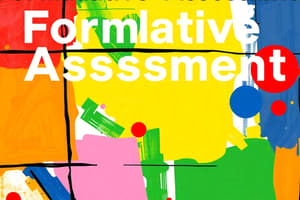Podcast
Questions and Answers
What is the primary role of assessment in education?
What is the primary role of assessment in education?
- To determine educational funding
- To provide insights into student progress (correct)
- To enforce strict grading policies
- To measure student attendance
How does assessment enhance the learning experience for students?
How does assessment enhance the learning experience for students?
- By implementing rigid teaching methods
- By creating a competitive environment
- By offering ongoing feedback for adjustments (correct)
- By eliminating the need for classroom discussions
Which type of assessment is typically conducted at the end of a course?
Which type of assessment is typically conducted at the end of a course?
- Summative assessment (correct)
- Formative assessment
- Diagnostic assessment
- Continuous assessment
What does formative assessment primarily focus on?
What does formative assessment primarily focus on?
How does effective teaching influence assessment outcomes?
How does effective teaching influence assessment outcomes?
What does diagnostic assessment identify prior to instruction?
What does diagnostic assessment identify prior to instruction?
Why is assessment considered a bridge between learning and teaching?
Why is assessment considered a bridge between learning and teaching?
Which characteristic of assessment enhances a supportive learning environment?
Which characteristic of assessment enhances a supportive learning environment?
What is the primary purpose of formative assessment?
What is the primary purpose of formative assessment?
What type of assessment occurs at the end of a unit or course?
What type of assessment occurs at the end of a unit or course?
Which of the following is a key characteristic of effective feedback?
Which of the following is a key characteristic of effective feedback?
What is the primary goal of aligning assessment with instructional strategies?
What is the primary goal of aligning assessment with instructional strategies?
Which type of assessment helps tailor instruction to meet individual learning needs?
Which type of assessment helps tailor instruction to meet individual learning needs?
What is an example of formative assessment?
What is an example of formative assessment?
Which component is essential for enhancing student learning through assessment?
Which component is essential for enhancing student learning through assessment?
What should assessments be designed to evaluate?
What should assessments be designed to evaluate?
What is a critical characteristic of timely feedback?
What is a critical characteristic of timely feedback?
How should actionable feedback be structured?
How should actionable feedback be structured?
What role does assessment data play in instructional decision-making?
What role does assessment data play in instructional decision-making?
What should reassessment of students who struggle with specific concepts involve?
What should reassessment of students who struggle with specific concepts involve?
To ensure fairness and equity in assessment practices, what factors should teachers consider?
To ensure fairness and equity in assessment practices, what factors should teachers consider?
What is a key component of constructive feedback?
What is a key component of constructive feedback?
Differentiated instruction is used to address what aspect of student learning?
Differentiated instruction is used to address what aspect of student learning?
What should effective feedback primarily focus on?
What should effective feedback primarily focus on?
Flashcards are hidden until you start studying
Study Notes
Importance of Assessment in Education
- Assessment is crucial for enhancing the educational experience of students and informs instructional decisions.
- A holistic approach to assessment fosters a supportive learning environment and promotes student success.
Role of Assessment in Learning and Teaching
- Functions as a bridge connecting learning and teaching, providing insights into student understanding.
- Helps identify areas for improvement while tailoring instruction to meet individual student needs.
Types of Assessments
-
Formative Assessment:
- Ongoing evaluations that provide feedback throughout the learning process to guide improvements.
- Examples include quizzes, discussions, and exit tickets.
-
Summative Assessment:
- Evaluates overall learning achievements at the end of a unit or course, often through exams or projects.
-
Diagnostic Assessment:
- Conducted prior to instruction to assess prior knowledge and skills, informing effective future learning strategies.
Alignment of Assessment with Learning Objectives
- Effective assessments should align with intended learning outcomes and instructional strategies to accurately reflect student progress.
- Clear learning objectives should define students' expected knowledge, understanding, and skills by the end of the learning experience.
Feedback as a Learning Tool
- Feedback should be timely, specific, actionable, and constructive to enhance student learning.
- Timeliness ensures feedback is relevant, while specificity hones in on particular aspects of student work.
- Actionable feedback empowers students to identify and implement improvement strategies.
Utilizing Assessment Data for Instructional Decisions
- Analyzing assessment results allows educators to identify student strengths and weaknesses.
- Responsive adjustments based on data support diverse learning needs and foster improved educational outcomes.
Fairness and Equity in Assessment Practices
- Assessment practices must promote fairness and ensure equal opportunities for all students to showcase their knowledge.
- Considerations include language proficiency, cultural background, and learning disabilities, ensuring assessments are accessible to all learners.
Studying That Suits You
Use AI to generate personalized quizzes and flashcards to suit your learning preferences.




